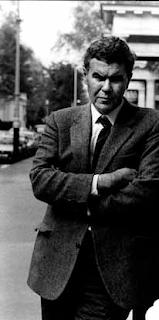Carver Indeed
 It took awhile, but I recently finished an anthology of short stories by Raymond Carver. I had read him in the past, but I'll admit that it was finally watching Robert Altman's "Short Cuts" (which was based on Carver) a few months ago that inspired a deeper read.
It took awhile, but I recently finished an anthology of short stories by Raymond Carver. I had read him in the past, but I'll admit that it was finally watching Robert Altman's "Short Cuts" (which was based on Carver) a few months ago that inspired a deeper read.I've recently heard that maybe Carver's editor deserves much of the credit for his success. Wherever the proper acclaim lies, it is well deserved. Not a word wasted here. Carver's writing has always conjured images of sculpting for me, and "carver" seems almost a too-perfect name for the author.
What's maddening about the man, though, is that he leaves me powerless to describe his appeal. It's easy to say that Edward Hopper is my favorite artist, because he captures a kind of uniquely American loneliness that no one else can even touch. It's easy for me to say that I'm drawn to the songwriting of Ray Davies because he has a certain cynical idealism and "two steps removed" perspective that I identify with.
But Carver? I'm at a loss.
Most, but not all, of his stories aren't much on plot. A boy goes fishing with a friend. A man is hostile toward, then becomes enchanted with, his wife's blind friend. A recovering alcoholic relates his experiences at a halfway house.
You read through the stories, navigating what seems like the mundane. You get to the end and you can't believe it's over. You mean after all that, the guy decides to rake his neighbors leaves? What the hell?
All I know is that he's onto something. It's become passe, cliche and a bunch of other French words for which Blogger will not let me add the accent to the "e"... to describe great literature as something that captures human nature, or that archaic term, "the human condition." But that's what still works for me, and all I know is, Carver did that. He dissected some element of that nature that no one else has in quite the same way. He did it without wasting a single word. And then he went outside and raked the leaves.


Comments
I have never been able to get enthusiastic about short stories. I never read the fiction in my New Yorker, unless I'm stuck on the subway and I've read everything else. I don't know why this is--maybe I just appreciate delayed payoff more. I think Dad has the same issue.
Or revisit Salinger's 9 Stories. Hard to beat any story by William Trevor or John Cheever, too.